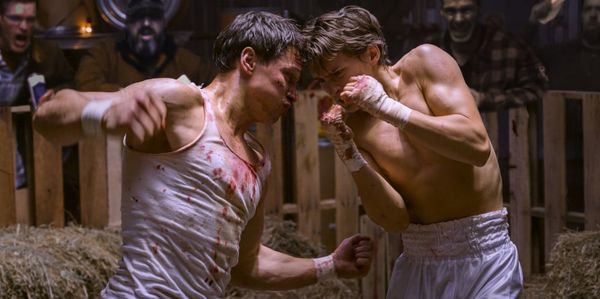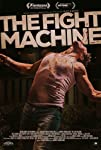Eye For Film >> Movies >> The Fight Machine (2022) Film Review
The Fight Machine
Reviewed by: Jennie Kermode

Setting aside the former-champion-has-one-last-go subgenre, there are, as rule, two types of film about fighting for a living. The first, and by far the most prolific, sees young people who have grown up in desperate poverty pursue fighting to earn a living and possibly find a way out. The other sees young men who have never wanted for money in all their lives take a walk on the wild side in an attempt to find themselves. Andrew Thomas Hunt combines these two stories in a film which screened at the Fantasia International Film Festival and which seems to have connected with the audience in a way which bodes well for a theatrical run.
From a critical perspective, it’s a bit of a mixed bag. There are a lot of films about fighting released each year, so one always hopes that they will find something new to say, or at least an interesting way of saying it. This one sets the bar very high for itself with a philosophical opening speech which, sadly, merely serves to illustrate the limited intellectual capacity oif people who routinely get punched in the head for a living. Not that fighting has to be about that, but in the case of Paul (Greg Hovenessian), it really is. One gets the impression that he likes it, as he seeks it out in other ways too, and that’s fair enough – the problem is the harm he does to other people.
What Paul really seems to want is to experience failure – to find out where the edge is so that he can feel that his various experiences actually matter. He has been coddled all his life, gifted a job at the family winery by his father (a magnificently sleazy Ted Atherton, who is one of the highlights of the film), and given a free pass, with a nod to his father, after being caught by the cops in a situation which would see the average person get 18 months in jail. It’s not that nobody worries – his parents tell him with ever increasing urgency that they don’t understand – but nobody can stop a determined tourist, and Paul has convinced himself that this is what it means to really be alive.
By contrast, Rob (Dempsey Bryk) longs for a life without fighting, but it’s a destiny which seems to have been carved out for him. His Uncle Tommy (an amiable Noah Dalton Danby) keeps the family afloat by taking punches in bare knuckle fights, no longer at his best but wise enough to know when to stay down and always ready with kindly advice for the newbies he’s supposed to knock around. Rob has real talent in boxing proper, and his father sees it as a means through which he might escape from poverty, though what Rob really wants is to forge his own path, perhaps through writing. It’s clear from the start that the two young men will meet, and it is from this external knowledge that the film attempts to derive most of its tension, with variable results.
As critiques of the wealth gap are concerned, it’s not very deep, but it’s buoyed up by some strong supporting performances and Hunt’s skill at capturing the action in the ring. Snippets of animation and the occasional hallucinatory moment embellish this and help to convey moments of savagery which might otherwise have been difficult, or very expensive. Hunt also rounds out the characters’ worlds with more care than one sees in most films of this ilk.
The film’s exploration of the pressures surrounding masculinity is also unsubtle but to the point. There is a lot of gender shaming and the sort of homophobia which doesn’t necessarily preclude shagging other men behind closed doors. Testosterone injections are just a fact of life, with a number of dubiously qualified people hanging around offering off-the-books medical treatment. Powerful painkillers are handed out like candy. There’s nothing here that’s new, but the ecosystem surrounding the fights is impressively brought to life.
Overall, there’s plenty here that works, especially if you’re the same age as the film’s protagonists and still haven’t seen much of the fight film canon. It’s just a shame that Hunt tries so hard to build existential meaning into it when he’s much better at finding meaning in the mundane.
Reviewed on: 30 Jul 2022















